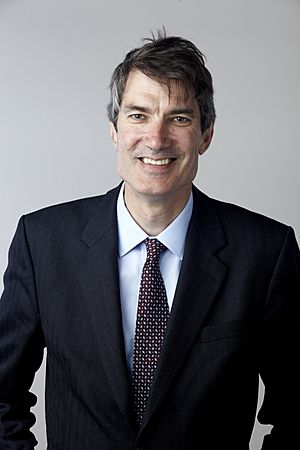Steven Cowley facts for kids
Quick facts for kids
Sir Steve Cowley
FRS FREng FInstP
|
|
|---|---|

Cowley in 2014
|
|
| 7th Director of the Princeton Plasma Physics Laboratory | |
| Assumed office 1 July 2018 |
|
| President | Donald Trump Joe Biden |
| Preceded by | Richard J. Hawryluk (interim) |
| 31st President of the Corpus Christi College | |
| In office 1 October 2016 – 30 September 2018 |
|
| Preceded by | Richard Carwardine |
| Succeeded by | Helen Moore |
| Personal details | |
| Born |
Steven Charles Cowley
1959 (age 65–66) Cambridge, Cambridgeshire, England |
| Children | Sean Cowley and Brendan Cowley |
| Alma mater | |
| Known for | Fusion power |
| Awards | Knight Bachelor (2018) Glazebrook Medal (2012) Harkness Fellowship (1981–83) |
| Scientific career | |
| Fields | |
| Institutions |
|
| Thesis | Some Aspects of Anomalous Transport in Tokamaks: Stochastic Magnetic Fields, Tearing Modes and Nonlinear Ballooning Instabilities (Convection) (1985) |
| Doctoral advisor | Russell Kulsrud |
Sir Steven Charles Cowley (born 1959) is a British theoretical physicist and international authority on nuclear fusion and astrophysical plasmas. He has served as director of the United States Department of Energy (DOE) Princeton Plasma Physics Laboratory (PPPL) since 1 July 2018. Previously he served as president of Corpus Christi College, Oxford, since October 2016. and head of the EURATOM / CCFE Fusion Association and chief executive officer of the United Kingdom Atomic Energy Authority (UKAEA). He was appointed chair of the board of trustees of the Faraday Institution in July 2024.
Education
Cowley won a scholarship to Corpus Christi College, Oxford and graduated with a Bachelor of Arts degree in Physics in 1981. He went on to study at Princeton University as a Harkness Fellow and was awarded a PhD in 1985 for research into tokamaks supervised by Russell Kulsrud.
Career and research
Following his PhD, Cowley completed postdoctoral research at the Culham Centre for Fusion Energy (CCFE). He returned to Princeton in 1987 and joined the faculty at University of California, Los Angeles (UCLA), in 1993, becoming full professor in 2000. At Imperial College, London, Cowley led the plasma physics group from 2001 to 2003, while also serving as a part-time professor. He was appointed as the head of the EURATOM / CCFE Fusion Association in September 2008 and as CEO of UKAEA in November 2009.
On 18 March 2015, he was elected the 31st President of Corpus Christi College, Oxford, his alma mater: he took up the post on 1 October 2016. He is the first scientist to hold the post.
On 1 July 2018, he was appointed director of the Princeton Plasma Physics Laboratory (PPPL).
Cowley's research interests are in plasmas and nuclear fusion, in astrophysical plasmas and the laboratory, such as the Joint European Torus (JET) and the International Thermonuclear Experimental Reactor (ITER). His research has been funded by Science and Technology Facilities Council (STFC) and the Engineering and Physical Sciences Research Council (EPSRC). Cowley co-chaired the National Academy of Sciences assessment of plasma science in the United States.
Awards and honours
Cowley was elected a Fellow of the Royal Society (FRS) in 2014. His biography reads;
Steven Cowley is a leading plasma theorist and currently chief executive officer at the UK Atomic Energy Authority. Much of his research career has been devoted to modelling and understanding plasma turbulence in nuclear fusion, a phenomenon that must be controlled to achieve stable fusion.
Nuclear fusion will offer future generations a cleaner and safer source of energy and has the potential to meet the majority of the world's energy demands. At present, however, more energy is required to feed the process than can be produced. Steven is leading the UK's participation in ITER, an experimental reactor that is set to make nuclear fusion commercially viable.
Steven's interest in plasmas extends to those found on a large scale throughout the Universe. He showed that these astrophysical plasmas also invariably exhibit turbulence, which amplifies and shapes their magnetic fields. Steven presented a 2009 TED talk entitled Fusion is Energy's Future and received the 2012 Glazebrook Medal from the Institute of Physics, which rewards leadership in a physics context.
His certificate of election reads:
Professor Cowley is currently chief executive officer at the UK Atomic Energy Authority and Professor at Imperial College. Over the last twenty years he has played a leading role in developing the multi-scale approach to computing the plasma turbulence in fusion experiments. Now such computations routinely reproduce experimental results. Multi-scale computational tools will be central to the successful development of fusion power. He discovered a key mechanism for the observed explosive eruptions from confined plasmas. Using analysis and computations Cowley and collaborators have shown that astrophysical plasmas are invariably turbulent. They have described the multi-scale spectra and structure of this turbulence and how it amplifies and shapes the magnetic field in the large scale plasmas of the universe.
Cowley was also elected a Fellow of the American Physical Society (APS) in 1998, the Institute of Physics (FInstP) in 2004 and the Royal Academy of Engineering (FREng) in 2014. He was awarded and honorary fellowship of the Institute of Engineering and Technology in 2015. In 2011, he was appointed to the UK Government's Council for Science and Technology.
In the 2018 Birthday Honours, Cowley was appointed a Knight Bachelor for services to science and to the development of nuclear fusion. In July 2019, Cowley was awarded the honorary degree of Doctor of Science (honoris causa) by the University of Lancaster for his standing as the international authority on fusion energy.

